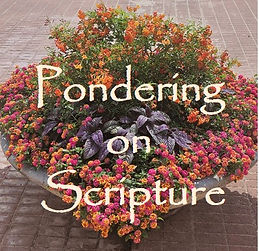
"Ponder the fact that God has made you a gardener, to root out vice and to plant virtue".
St. Catherine of Siena
This page is for pondering on the Theological Virtues of FAITH, HOPE, CHARITY, and on Scripture.
Sunday - Reflection on the Gospel
(Credit to: "Catholic Daily Reflections")
The reflection on today's Gospel reading on catholic-daily-reflections.com is titled, "Humble Instruments of Grace" and it relates to Mark 7:31-37.
The reflection title, "Humble Instruments of Grace", immediately captured my attention and sparked my interest.
The "Instruments" reference is used in the Reflection to help us easily relate with the central point of today's Gospel reading: "He put his finger into the man's ears and, spitting, touched his tongue; then he looked up to heaven and groaned, and said to him, 'Ephphatha!' - that is, 'Be opened!' - And immediately themain's ears were opened, his speech impediment was removed, and he spoke plainly."
The Reflection author does a wonderful job of explaining a personal take on the reading. Using reference to Jesus using his finger and saliva to heal the man, and, connecting us with the Gospel with fact "we, as a member of Christ's Body, the Church, we areto Jesus' hands and feet, His eyes and voice, His heart and finger, and even His saliva"
The author goes on to encourage us to "reflect upon the image of Jesus healing the deaf and mute man and to call to mind that if God can use His finger and saliva, He can certainly use us, no matter how unworthy, for His glory."
Lord, I hear your Word, I have seen how you heal, and am conscious of the call for me to listen to those in need and to share the "Good News" about Jesus. Please use me as an instrument of Your grace! Amen!

9/13/24 - Today I decided to explore for new meditations for our Catholic Faith and it only took a couple of minutes to find an excellent article on the americanmagazine.org website.
The title of the article is "Pope Francis: Meditation is for everyone. But for Christians, it must lead to Jesus" and it is authored by Pope Francis.
The second sentence of the opening paragraph captured my full attention and proved worthy of a few minutes of meditation: "For a Christian, to “meditate” is to seek meaning: it implies placing oneself before the immense page of Revelation to try to make it our own, assuming it completely."
There is much to meditate on in this wonderful article and I highly recommend you take some time to read it (click on the "Button" below) and meditate on the Pope's powerful message on meditation!

8/30/24 - Today I spent a few minutes to ponder on the "Gift of Faith" and slowly read part of the Encyclical Letter, LUMEN FIDEI, written by Pope Francis:
"Faith, received from God as a supernatural gift, becomes a light for our way, guiding our journey through time. On the one hand, it is a light coming from the past, the light of the foundational memory of the life of Jesus which revealed his perfectly trustworthy love, a love capable of triumphing over death.
Yet since Christ has risen and draws us beyond death, faith is also a light coming from the future and opening before us vast horizons which guide us beyond our isolated selves towards the breadth of communion. We come to see that faith does not dwell in shadow and gloom; it is a light for our darkness."
Lord, thank You for the Gift of Faith! This gift, this unique "light", is always available for overcoming any "darkness" in my life and for traveling along my spiritual journey into the future.
If you are interested in reading the entire Encyclical, click on the "Button" below.

8/30/24 - “SPE SALVI facti sumus”—in hope we were saved, says Saint Paul to the Romans."
What a blessing to know that "in hope I was saved!"
What an encouragement worthy of pondering!
Benedict states, "Only when the future is certain as a positive reality does it become possible to live the present as well. So now we can say: Christianity was not only “good news”—the communication of a hitherto unknown content. In our language we would say: the Christian message was not only “informative” but “performative”. That means: the Gospel is not merely a communication of things that can be known—it is one that makes things happen and is life-changing. The dark door of time, of the future, has been thrown open. The one who has hope lives differently; the one who hopes has been granted the gift of a new life."
Lord, thank you for your Son, Jesus, and the "hope" we gain through him and the Gospel. May I rely upon this "hope" and live "differently" knowing I have been granted a new life.
Amen!

Charity is a theological virtue that combines love for God with love for neighbor and in the Encyclical DEUS CARITAS EST, Pope Benedict XVI provides wonderful guidance for us to practice CHARITY!
In the Introduction Section of the Encyclical Benedict shares, “God is love, and he who abides in love abides in God, and God abides in him” (1 Jn 4:16). These words from the First Letter of John express with remarkable clarity the heart of the Christian faith: the Christian image of God and the resulting image of mankind and its destiny."
And we find a great connection and combination for the love of God and love for neighbor as we read, "Jesus united into a single precept this commandment of love for God and the commandment of love for neighbour found in the Book of Leviticus: “You shall love your neighbour as yourself” (19:18; cf. Mk 12:29-31). Since God has first loved us (cf. 1 Jn 4:10), love is now no longer a mere “command”; it is the response to the gift of love with which God draws near to us."
Reading on through the Encyclical I found it very interesting to read what Benedict provided as a definition for "neighbor." According to Benedict we might best consider our "neighbor" as "anyone who needs me, and whom I can help, is my neighbour."
I also found it quite interesting and helpful to read what Benedict shared on "love for thy neighbour - Love of neighbour is thus shown to be possible in the way proclaimed by the Bible, by Jesus. It consists in the very fact that, in God and with God, I love even the person whom I do not like or even know. This can only take place on the basis of an intimate encounter with God, an encounter which has become a communion of will, even affecting my feelings. Then I learn to look on this other person not simply with my eyes and my feelings, but from the perspective of Jesus Christ. His friend is my friend. Going beyond exterior appearances, I perceive in others an interior desire for a sign of love, of concern. This I can offer them not only through the organizations intended for such purposes, accepting it perhaps as a political necessity. Seeing with the eyes of Christ, I can give to others much more than their outward necessities; I can give them the look of love which they crave."
If you are interested in reading the entire Encyclical, click on the "Button" below:

Hebrew 11: 6 -And without faith it is impossible to please God, because anyone who comes to him must believe that he exists and that he rewards those who earnestly seek him.
Reading this scripture and spending a few minutes to ponder on it, a question pops up in my mind. Do I want to please God? If so, what might I change in my behavior that would please Him?
My belief is that God desires our love. And, as I think on how I show my love for God, I ponder on how I, at times, show love to those I love. Showing compassion, respecting the individual, doing kind things, forgiving others as I would like for them to forgive me, express (in words and body language) the word "love" to the person, listening attentively, and communicating empathy and thankfulness.
God desires my love. I pray that it will become a habit for me to show love to Him through obedience, expressing my thanks for all blessings, being kind to others, and listening attentively to Him.

Luke 4:18 - Jesus came to Nazareth, where he had grown up,
and went according to his custom
into the synagogue on the sabbath day.
He stood up to read and was handed a scroll of the prophet Isaiah.
He unrolled the scroll and found the passage where it was written:
The Spirit of the Lord is upon me,
because he has anointed me
to bring glad tidings to the poor.
He has sent me to proclaim liberty to captives
and recovery of sight to the blind,
to let the oppressed go free,
and to proclaim a year acceptable to the Lord.
Rolling up the scroll,
he handed it back to the attendant and sat down,
and the eyes of all in the synagogue looked intently at him.
He said to them,
“Today this Scripture passage is fulfilled in your hearing.”
And all spoke highly of him
and were amazed at the gracious words that came from his mouth.
They also asked, “Is this not the son of Joseph?”
He said to them, “Surely you will quote me this proverb,
‘Physician, cure yourself,’ and say, ‘Do here in your native place
the things that we heard were done in Capernaum.’”
And he said,
“Amen, I say to you, no prophet is accepted in his own native place.
Indeed, I tell you,
there were many widows in Israel in the days of Elijah
when the sky was closed for three and a half years
and a severe famine spread over the entire land.
It was to none of these that Elijah was sent,
but only to a widow in Zarephath in the land of Sidon.
Again, there were many lepers in Israel
during the time of Elisha the prophet;
yet not one of them was cleansed, but only Naaman the Syrian.”
When the people in the synagogue heard this,
they were all filled with fury.
They rose up, drove him out of the town,
and led him to the brow of the hill
on which their town had been built, to hurl him down headlong.
But he passed through the midst of them and went away.
"Today this Scripture passage is fulfilled in your hearing." Must have been "sweet music" to the ears of the synagogue audience! What "gracious" words from Jesus' mouth!
While reading this scripture is quite an interesting message giving hope, the air was let out of the baloon as Jesus informs us that "no prophet is accepted in his own native place."
What is it that causes the air to escape the baloon?
It seems to me that the cause relates to my false expectations that I am worthy of fulfillment just based on hearing the "word." Perhaps, the annointing brings with it the call of response ("bringing glad tidings to the 'poor'; proclaiming liberty to captives; proclaiming the 'Good News" of Jesus; etc.) and that I fall short responding.
Lord, I hear the message, I want to respond as called. Please give me courage to respond with hope and with charity (love for You and love for neighors). AMEN!
